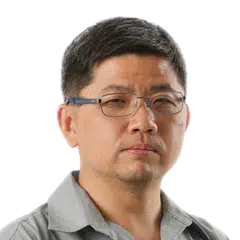Adherence to common rules key to maintaining collective peace: Ng Eng Hen
Sign up now: Get ST's newsletters delivered to your inbox

Defence Minister Ng Eng Hen (centre) at a panel discussion at the 61st annual Munich Security Conference in Germany on Feb 15.
PHOTO: MINDEF
SINGAPORE – Countries around the world must abide by a set of common rules if the world is to continue having peace and stability, Defence Minister Ng Eng Hen said during his three-day visit to Germany that ended on Feb 16.
Dr Ng said this as he laid out how great power rivalry is shaping up in Asia, and the radical changes the latest US administration has made to its foreign policy, in speeches at the 61st annual Munich Security Conference (MSC) and other sideline events.
At a panel discussion at the MSC on Feb 15, he pointed to how both China and the US have been stepping up their military presence in the South China Sea and the Taiwan Strait, as have some European countries.
For instance, China increased patrols around disputed territories in the South China Sea by 17 per cent in 2024, while the presence of its maritime militia has risen by 35 per cent since 2022, according to figures from the Centre for Strategic and International Studies, a think-tank.
Meanwhile, the US had, since 2011, negotiated 12 new defence sites in the Philippines and Australia and built new installations in Japan and Guam, according to a US congressional report. Altogether, it has about 140,000 troops at 29 military bases in the region.
Dr Ng urged countries to look at the strategic goals that these powers have in the region, aside from individual disputes.
“If this is just about territorial disputes, we (the defence community) won’t need to be here, you could leave it to the countries (involved to resolve matters),” he said. “You either accept that there’s strategic rivalry, the great game is going on in the South China Sea, or you don’t.”
For the US, the aim is to maintain its dominance as a Pacific power by working with its allies. Some European countries are also keen to signal to the US that they are reliable allies, including in the Asia-Pacific, said Dr Ng.
But it is also obvious to all that the US has radically changed the basis of its global reach and supremacy, he added.
“In my mind, it is that America’s primacy has become the overriding consideration. Not that it never was, but I think that it has now become the Pole Star of foreign policy, even at the expense of bilateral ties or multilaterals,” he said. “It is a great disruption, so we have got to recognise that.”
As for China, its strategic intent is twofold, said Dr Ng.
First, its actions in the South China Sea are a response to the US’ containment strategy that originated from the latter’s campaign to contain Japanese expansion during World War II.
Second, Dr Ng said China’s presence in those waters is its own rendering of the Monroe Doctrine, named after former US president James Monroe. In essence, this means China views any intervention in the region’s affairs by external parties as a potentially hostile act.
While China is not yet strong enough to enforce such a doctrine, Dr Ng noted that it now has the world’s largest maritime fighting force, operating 234 warships to the US’ 219 warships.
The dilemma for China is that while it needs to show strength to the US and its allies, it also needs to manage relations with its smaller neighbours in Asean, added Dr Ng.
This dichotomy is why negotiations on the South China Sea code of conduct
Against this backdrop of greater military presence in the region has been a shift in trade relations that countries have with the US and China, even before the fresh salvos of tariffs from the US,
China now accounts for 80 per cent of the world’s solar manufacturing capacity and half its electric vehicle production, and “this dichotomy going forward between the US and China will put pressure on trade and security”.
The upside is that both powers appear to want to use their military strength for deterrence rather than to start a war, said Dr Ng.
However, this “indeterminate phase” in world affairs also means there is no leader to protect the global commons, and progress on international issues will suffer.
“To me, that is a given, it is just (by) how much,” he said. “That includes any global regime to deal with climate change.”
During his trip, Dr Ng met officials from several countries. They included Ms Kaja Kallas, European Commission vice-president and EU High Representative for Foreign Affairs and Security Policy; Ukrainian Minister of Defence Rustem Umerov; and Mr Anwar Gargash, the diplomatic adviser to the United Arab Emirates president, said Mindef in a release.
Mike Yeo is a correspondent at The Straits Times, where he covers mainly defence issues.



